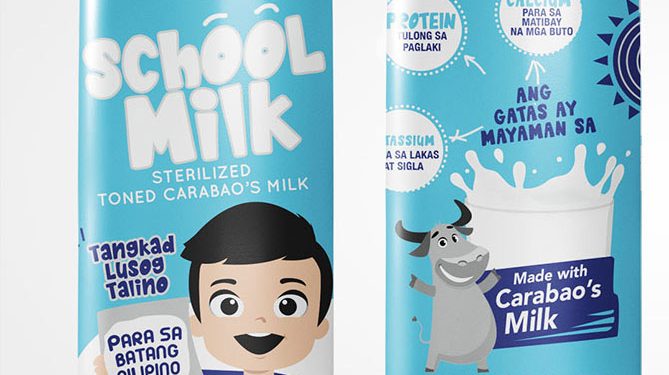SMC’s new packaging technology saves farms, feeds the undernourished amid COVID-19

More Filipino children from far-flung and hard-to-reach areas in Luzon will soon be able to taste and benefit from local carabao’s milk.
San Miguel Corporation (SMC) is partnering with carabao cooperatives to boost their incomes by providing milk for government’s nationwide milk feeding program utilizing its new packaging solution that will prolong the product’s shelf life.
SMC’s packaging unit, San Miguel Yamamura Packaging Corp. (SMYPC), recently signed an agreement with the Philippine Carabao Center (PCC), an attached agency of the Department of Agriculture, that will see SMYPC packing an initial four million cans of sterilized carabao’s milk, to be distributed in Regions 1 to 3 and parts of the Cordillera Administrative Region (CAR).
SMC president and chief operating officer Ramon S. Ang said that under the agreement, SMYPC will act as a third-party toll packer utilizing its new retort process to package some 40,000 liters of carabao milk supplied by local farmer’s cooperatives in Nueva Ecija, for the nationwide school-based feeding program under the Department of Education (DepEd) and the Department of Social Welfare and Development (DSWD).
Last year, the PCC-assisted dairy cooperatives committed to provide milk to 503,955 children while for 2021 so far, 1,012,840 children are benefiting from carabao milk provided by local dairy cooperatives. The agreement with SMC, set to start later this month, significantly increases the carabao milk supplied from local dairy cooperatives to the DepEd and the DSWD under the national feeding program.
“We are very happy that almost one year since we promised to help the carabao cooperatives, we will now see both farmers and our school children benefit from this worthy endeavor. I’m very proud that we at San Miguel were able to use our resources and our expertise to help build the capacities and capabilities of our local farmers at this time of pandemic,” Ang said.
With the retort process, carabao’s milk can be preserved up to six months without preservatives, and packaged in aluminum cans. Previously, carabao in flexible packaging was only good for a maximum of seven days.“With a longer shelf life, carabao’s milk will now reach more children in need of nutritional support and address nutritional deficiencies that impair their health and learning ability. At the same time, this will boost the livelihood of local dairy farmers who have always been looking for ways to keep carabao’s milk fresh and prevent spoilage,” Ang said.
Aside from the extended shelf-life, the sterilized canned milk can easily be transported, stored under ambient temperature, and delivered in bulk rather than on a daily basis.
“With this technology, we expect that more school children will be able to drink nutritious carabao’s milk, particularly those who reside in far-flung, mountainous and hard-to-reach areas, and those with no electricity or limited storage facilities,” he added.
The DepEd and DSWD’s feeding program, mandated by Republic Act 11037 or the “Masustansyang Pagkain para sa Batang Pilipino Act”, aims to address the nutritional needs of undernourished children to combat hunger and malnutrition. It serves the undernourished children in public day care kindergarten and elementary schools from kindergarten up to Grade 6.
With the funding provided by the DepEd and DSWD, PCC will consolidate carabao’s milk from local dairy farmer cooperatives in Nueva Ecija and deliver these to the San Miguel Yamamura Packaging Corp. facility in San Fernando, Pampanga for sterilization and packaging.
From the SMC plant in Pampanga, the sterilized carabao’s milk will then be delivered to schools division offices (SDOs) for distribution to the undernourished children.
Ang said the company’s new equipment for the new retort process can also be used for a variety of beverage products, including teas, coffee, soya, and other milk-based products.
Last year, SMC had helped the farmers by buying up thousands of liters of excess carabao milk for donation to poor communities at the height of pandemic restrictions. It also promised to help make carabao milk more marketable by developing a packaging format for the farmer cooperatives, for free.
“It is through meaningful and sustainable programs like this that we will empower various sectors to not just weather the impacts of the pandemic, but have more opportunities to grow in the future. Apart from supplying the needs of our school children, our cooperatives and farmers can even think about creating their own brands and competing in the market. Carabao milk is very nutritious and is loved by many Filipinos. This can only serve to grow their market and reach and boost the industry overall,” Ang added.






